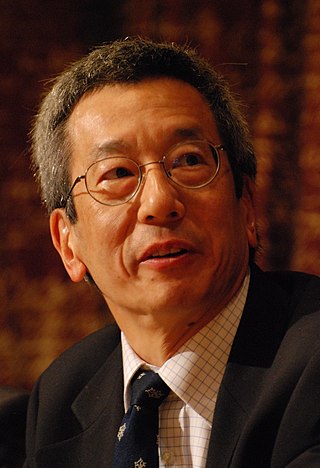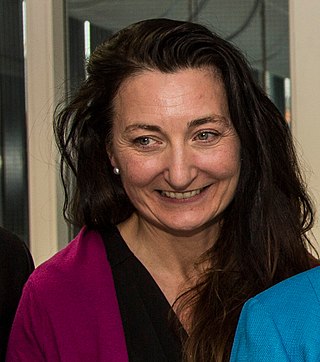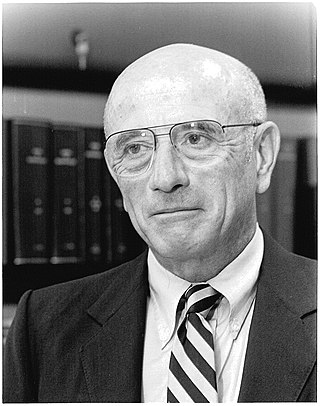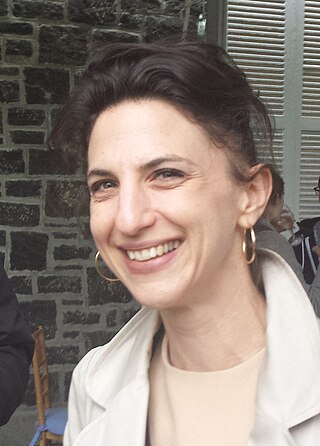Related Research Articles

Cognitive neuroscience is the scientific field that is concerned with the study of the biological processes and aspects that underlie cognition, with a specific focus on the neural connections in the brain which are involved in mental processes. It addresses the questions of how cognitive activities are affected or controlled by neural circuits in the brain. Cognitive neuroscience is a branch of both neuroscience and psychology, overlapping with disciplines such as behavioral neuroscience, cognitive psychology, physiological psychology and affective neuroscience. Cognitive neuroscience relies upon theories in cognitive science coupled with evidence from neurobiology, and computational modeling.

Roger Yonchien Tsien was an American biochemist. He was a professor of chemistry and biochemistry at the University of California, San Diego and was awarded the Nobel Prize in Chemistry for his discovery and development of the green fluorescent protein, in collaboration with organic chemist Osamu Shimomura and neurobiologist Martin Chalfie. Tsien was also a pioneer of calcium imaging.

The Moser research environment is the informal name of a research environment established and led by the Nobel laureates Edvard Moser and May-Britt Moser at the Norwegian University of Science and Technology (NTNU) in Trondheim, Norway. The Mosers joined the university as professors of psychology in 1996, and formed their own neuroscience research group. The research group eventually evolved into several projects and research centers. The Mosers were awarded the 2014 Nobel Prize in Physiology or Medicine "for their discoveries of cells that constitute a positioning system in the brain."

Cornelia Isabella "Cori" Bargmann is an American neurobiologist. She is known for her work on the genetic and neural circuit mechanisms of behavior using C. elegans, particularly the mechanisms of olfaction in the worm. She has been elected to the National Academy of Sciences and had been a Howard Hughes Medical Institute investigator at UCSF and then Rockefeller University from 1995 to 2016. She was the Head of Science at the Chan Zuckerberg Initiative from 2016 to 2022. In 2012 she was awarded the $1 million Kavli Prize, and in 2013 the $3 million Breakthrough Prize in Life Sciences.

Earl Keith Miller is a cognitive neuroscientist whose research focuses on neural mechanisms of cognitive, or executive, control. Earl K. Miller is the Picower Professor of Neuroscience with the Picower Institute for Learning and Memory and the Department of Brain and Cognitive Sciences at Massachusetts Institute of Technology. He is the Chief Scientist and co-founder of SplitSage.
Richard Winyu Tsien, is a Chinese-born American electrical engineer and neurobiologist. He is the Druckenmiller Professor of Neuroscience, Chair of the Department of Physiology and Neuroscience, and Director of the NYU Neuroscience Institute at New York University Medical Center, and also an emeritus faculty member of Stanford University School of Medicine.

Edvard Ingjald Moser is a Norwegian psychologist and neuroscientist, who is a professor at the Norwegian University of Science and Technology (NTNU) in Trondheim. In 2005, he and his then-wife May-Britt Moser discovered grid cells in the brain's medial entorhinal cortex. Grid cells are specialized neurons that provide the brain with a coordinate system and a metric for space. In 2018, he discovered a neural network that expresses your sense of time in experiences and memories] located in the brain's lateral entorhinal cortex.

May-Britt Moser is a Norwegian psychologist and neuroscientist, who is a Professor of Psychology and Neuroscience at the Norwegian University of Science and Technology (NTNU). She and her then-husband, Edvard Moser, shared half of the 2014 Nobel Prize in Physiology or Medicine, awarded for work concerning the grid cells in the entorhinal cortex, as well as several additional space-representing cell types in the same circuit that make up the positioning system in the brain. Together with Edvard Moser she established the Moser research environment at NTNU, which they lead. Since 2012 she has headed the Centre for Neural Computation.

Karl Alexander Deisseroth is an American scientist. He is the D.H. Chen Professor of Bioengineering and of psychiatry and behavioral sciences at Stanford University.
The W. Alden Spencer Award is awarded to an investigator in recognition of outstanding research contributions by the College of Physicians and Surgeons, the Department of Neuroscience, and The Kavli Institute for Brain Science at Columbia University. It is named after W. Alden Spencer, a Professor of Physiology and Neurology at Columbia University. The award winner also gives a lecture. In 2018, it took place at on October 9, 2018.

Edward Roy Perl was an American neuroscientist whose research focused on neural mechanisms of and circuitry involved in somatic sensation, principally nociception. Work in his laboratory in the late 1960s established the existence of unique nociceptors. Perl was one of the founding members of the Society for Neuroscience and served as its first president. He was a Sarah Graham Kenan Professor of Cell Biology & Physiology and a member of the UNC Neuroscience Center at the University of North Carolina School of Medicine.

John O'Keefe, is an American-British neuroscientist, psychologist and a professor at the Sainsbury Wellcome Centre for Neural Circuits and Behaviour and the Research Department of Cell and Developmental Biology at University College London. He discovered place cells in the hippocampus, and that they show a specific kind of temporal coding in the form of theta phase precession. He shared the Nobel Prize in Physiology or Medicine in 2014, together with May-Britt Moser and Edvard Moser; he has received several other awards. He has worked at University College London for his entire career, but also held a part-time chair at the Norwegian University of Science and Technology at the behest of his Norwegian collaborators, the Mosers.

Feng Zhang is a Chinese-American biochemist. Zhang currently holds the James and Patricia Poitras Professorship in Neuroscience at the McGovern Institute for Brain Research and in the departments of Brain and Cognitive Sciences and Biological Engineering at the Massachusetts Institute of Technology. He also has appointments with the Broad Institute of MIT and Harvard. He is most well known for his central role in the development of optogenetics and CRISPR technologies.
The Karl Spencer Lashley Award is awarded by The American Philosophical Society as a recognition of research on the integrative neuroscience of behavior. The award was established in 1957 by a gift from Dr. Karl Spencer Lashley.
Joe Z. Tsien is a neuroscientist who pioneered Cre/lox-neurogenetics in the mid-1990s, a versatile toolbox for neuroscientists to study the complex relationships between genes, neural circuits, and behaviors. He is also known as the creator of the smart mouse Doogie in the late 1990s while being a faculty member at Princeton University. Recently, he developed the Theory of Connectivity in an effort to explain the origin of intelligence, or the basic design principle underlying brain computation and intelligence. The theory states that brain computation is organized by a power-of-two-based permutation logic in constructing cell assemblies - the basic building blocks of neural circuits. The theory has received initial validation from experiments. The discovery of this basic computational logic of the brain can have important implications for the development of artificial general intelligence.

Vanessa Julia Ruta, Ph.D. is an American neuroscientist known for her work on the structure and function of chemosensory circuits underlying innate and learned behaviors in the fly Drosophila melanogaster. She is the Gabrielle H. Reem and Herbert J. Kayden Associate Professor and Head of the Laboratory of Neurophysiology and Behavior at The Rockefeller University and, as of 2021, an Investigator of the Howard Hughes Medical Institute.
David W. Tank is an American molecular biologist and neuroscientist who is the Henry L. Hillman Professor in Molecular Biology at Princeton University and the co-director of the Princeton Neuroscience Institute along with psychology professor Jonathan Cohen.
The Ralph W. Gerard Award of the Society for Neuroscience (SfN) is an award in neuroscience awarded annually since 1978 for Lifetime Achievement. It is the highest recognition conferred by the SfN. As of 2018, the prize winner receives US$25,000.
The IBRO Dargut and Milena Kemali International Prize for Research in the field of Basic and Clinical Neurosciences' is a prize awarded every two years to an outstanding researcher, under 45 years old, who made important contributions in the field of Basic and Clinical Neurosciences. The award was established in 1998.

Alex Leo Kolodkin is an American neuroscientist. He is the Charles J. Homcy and Simeon G. Margolis Professor in the Department of Neuroscience at the Johns Hopkins University School of Medicine.
References
- ↑ "Member Obituaries: Edward R. Perl", Society for Neuroscience, 2014
- ↑ "The Perl-UNC Neuroscience Prize". UNC Neuroscience Center. Retrieved 7 February 2020.
- ↑ Leslie H. Lang, "Californian wins neuroscience prize endowed by UNC-CH scientist", UNC News Services, 10 October 2000
- ↑ Leslie H. Lang, "Rockefeller University professor to receive Perl-UNC Neuroscience Prize", UNC News Services, 14 March 2002
- ↑ Leslie H. Lang, "Seattle, New York researchers to receive neuroscience prize endowed by UNC scientist", UNC News Services, 25 February 2003
- ↑ "Profiles of the 2004 Nobel Medicine Laureates", Agence France Press, 4 October 2004
- ↑ Leslie H. Lang, "Swiss researcher to receive neuroscience prize endowed by UNC scientist Perl", UNC News Services, 12 March 2004
- ↑ "He says: 'Don't call me professor.' They call him 'world-class superstar of science'", The Western Mail Cardiff, Wales: 22–23, 24 June 2013
- ↑ Leslie H. Lang "California researcher to receive neuroscience prize endowed by UNC scientist Perl", UNC News Services, 21 February 2005
- ↑ "Roger Tsien Receives Neuroscience Prize", UC San Diego Health System, 21 September 2005
- ↑ "California scientists are named recipients of the Perl-UNC neuroscience Prize", UNC News Services, 25 January 2006
- ↑ "Johns Hopkins scientist receives seventh Perl-UNC Neuroscience Prize", UNC News Services, 2007
- ↑ "Baylor College scientist wins Perl-UNC Neuroscience Prize", UNC, 20 May 2008, archived from the original on 2 May 2019, retrieved 21 May 2015
- ↑ "Baylor scientist wins Perl-UNC Neuroscience Prize", Baylor College of Medicine, from the Labs, 7 (5), June 2008, archived from the original on 2016-03-04, retrieved 2015-05-22
- ↑ "Harvard scientist wins Perl-UNC Neuroscience Prize", UNC, 1 May 2009
- ↑ "Columbia scientist wins 10th Perl-UNC Neuroscience Prize", UNC, 30 April 2010[ permanent dead link ]
- ↑ "Catherine Dulac, Cori Bargmann are co-recipients of 11th Perl-UNC Neuroscience Prize", UNC, 12 April 2011, archived from the original on 8 September 2018, retrieved 21 May 2015
- ↑ "Harvard scientist wins 11th Perl-UNC Neuroscience Prize", The Harvard Gazette, 18 April 2011
- ↑ "Cornelia Bargamann receives Kavli Prize in Neuroscience", The Rockefeller University Newswire, 31 May 2012, archived from the original on 3 April 2015, retrieved 22 May 2015
- ↑ "Stanford and MIT scientists win Perl-UNC Neuroscience Prize", UNC, 30 April 2012, archived from the original on 8 January 2015, retrieved 21 May 2015
- ↑ "Institute faculty share prestigious neuroscience prize", MIT News, 26 April 2012
- ↑ "Stanford and MIT scientists win Perl-UNC Neuroscience Prize", Psychology & Psychiatry Journal: 282, 12 May 2012
- ↑ "Norwegian scientists win Perl-UNC Neuroscience Prize", UNC, 17 December 2012, archived from the original on 11 March 2017, retrieved 21 May 2015
- ↑ James Gorman, "A Sense of Where You Are", The New York Times Science: 1, 30 April 2013
- ↑ "Marcus Raichle wins Perl-UNC Neuroscience Prize", UNC, 27 January 2014
- ↑ "Princeton's David Tank wins Perl-UNC Neuroscience Prize", UNC, 15 January 2014
- ↑ "Faculty Award: Tank receives Perl-UNC Neuroscience Prize", News at Princeton, 15 January 2015
- ↑ "Harvard's Christopher Walsh wins Perl-UNC Neuroscience Prize", UNC, 4 February 2016
- ↑ "17th Perl-UNC Neuroscience Prize Recipient Announced", UNC, 25 January 2016, archived from the original on 2 February 2017, retrieved 25 January 2017
- ↑ "18th Perl-UNC Neuroscience Prize Recipient Announced", unchealthcare.org, 29 January 2018